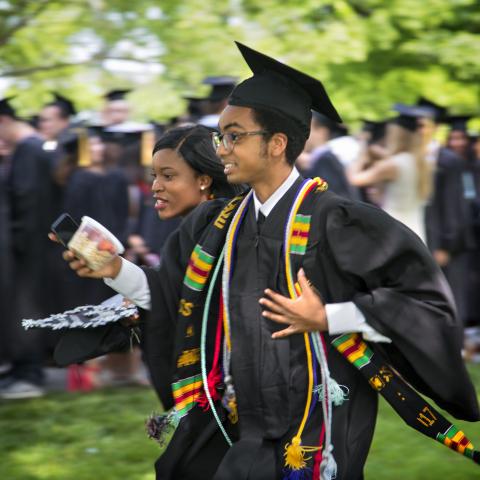Jump to:
- New Student Information
- Your Visa Application
- Money Matters
- Employment and Taxes
- Travel and Visas
- Avoiding Scams
New Student Information
Welcome to Cornell! Explore Getting Started for students and Your First Week for information you'll need as you travel to the U.S. and get settled on campus. You'll find additional student resources in Life at Cornell.
What visa-related steps do international students need to complete on arrival?
Do you offer an orientation for new and transfer students?
Yes! Ithaca students, please check Orientation Options for registration information. Orientation is a fun and fast way to learn how Cornell works and connect with fellow international students.
Is international orientation mandatory for international students?
How can I get to Ithaca from nearby cities and airports?
Where can I find information about housing and move-in?
Watch Cornell Housing's move-in page for arrival instructions.
How do I sign up for my classes?
Follow these links to find the course roster and information on enrollment.
What do I need to know about health services and insurance?
Your Visa Application
I received my I-20/DS-2019 from Cornell and need a visa. How soon can I apply?
Make an appointment at a U.S. consulate to obtain an entry visa stamp. The appointment cannot be more than 120 days ahead of your program end date shown on your I-20/DS-2019.
Canadian citizens do not need a visa stamp. At the port of entry, show your Canadian passport and I-20/DS-2019 to request F-1/J-1 student immigration status to attend Cornell University. If you are a Canadian “landed immigrant,” please check with a U.S. consulate to find out if you need a visa stamp.
Can Cornell assist in making a visa appointment or filling out my DS-160?
While we can't assist in scheduling a visa appointment, you can find the most up-to-date wait times on the U.S. Department of State website. The DS-160 is a personal application, so we cannot assist in filling out the form, but the website offers guidance on the DS-160 form.
U.S. embassies and consulates in some countries have long waits for visa appointments. Will this affect my ability to study at Cornell?
The U.S. Department of State currently prioritizes F-1 and J-1 visa applications with I-20 or DS-2019 program start dates within the next 60 days. Please monitor the status of appointments in your home country.
Cornell will continue to monitor visa and travel issues that might affect returning international students and will make adjustments to address your needs as much as possible. While Cornell does not officially recommend this practice due to the risk of delays or denials, we understand that some students and scholars have been successful in applying for a visa in a third country. Learn more about visa delays.
The earliest available visa appointments are after classes start. What should I do?
It is best to take the earliest available appointment time—even if the appointment is after your program start date—so that you can apply for an expedited visa request. You need to have a scheduled appointment before you ask to have the appointment expedited!
Please check with your nearest U.S. consulate or embassy to find out how to request an expedited or emergency visa appointment. Consulates will only schedule an expedited visa appointment within 60 days of your program start date. See the listed program start date on your I-20 to find out if you're eligible.
You may also request a visa support letter from your admitting academic department. Be sure to keep your academic department updated on your expected arrival if you plan on arriving after the listed program date on your I-20.
What do I do if my visa is not approved in time for me to make it to the campus by the enrollment date?
I'm worried about my visa application. Am I eligible to enroll in fully online courses?
No. F-1 students are permitted to take no more than 3 credit hours of online study per term.
I'm planning to enter the U.S. on a tourist visa. Can I start my classes on a tourist visa?
No! Immigration regulations do not allow tourist visa holders to participate in degree programs. Students who are issued a Cornell I-20 for an F-1 visa or DS-2019 for a J-1 visa must apply for the appropriate visa to study in the United States. Contact us if you have questions about your visa status.
What are my options to defer my admission if I can't obtain an F-1/J-1 visa?
If you are unable to obtain a visa or will arrive late, you should contact your department or the admissions office and request information about your options for attending in a later semester. Cornell Tech students, please email admissions@tech.cornell.edu.
Money Matters
Are scholarships and financial aid available for international students?
Undergraduates: Learn about need-aware financial aid. Graduate students: Find out how to apply for grants and loans.
How can I find out about local banking?
Check out Your First Week for pointers on local banks and other important things to know and do when you arrive on campus.
Do I need to get a Social Security number?
Is there any help for a family emergency requiring a trip home or a health emergency in the U.S.?
Employment and Taxes
Will I need to pay U.S. taxes?
Most international visitors living in the United States are required to file annual income tax returns. U.S. tax law is very complex. Here is a brief summary of what you need to know.
We are not tax experts and cannot help you file your tax returns, but we provide access to a free tax software product and support services. Sprintax is available to all members of the Cornell international community.
Am I eligible to work on campus?
F-1 students do not need special authorization to work on campus. You can work at any type of job on campus. It does not have to be in your field of study.
J-1 students must obtain a J-1 student on-campus employment authorization letter from International Services before starting work. Authorization can only be given for 12 months at a time, so you will need to renew this authorization letter annually.
Find out more about on campus employment.
Where can I find a job on campus?
Check out our webpage about student jobs on the Ithaca campus before you begin your search. Then start on this page to search campus employment opportunities.
Can I earn passive income?
International students should approach passive income generation with caution. However, certain passive income-generating activities may be permissible as long as no employment is taking place. "Employment" is any work performed in exchange for compensation. Compensation can include money, room and board, or other significant benefits. Examples of passive income are income earned through investment in stocks or bonds, or through a business that you have invested in but do not work for. However, passive income can become active under certain conditions (time, effort, if treated like a business). It is recommended that you consult with an experienced immigration attorney if you have additional questions about passively earning income.
How can I get help with my I-9 employment authorization form?
Where can I go for career advice?
I’m in OPT/STEM OPT. When permitted by my employer, can I work remotely?
Students participating in OPT and OPT STEM may work remotely if their employer has an office outside of the U.S. or the employer can assess student engagement using electronic means. Students participating in OPT do not need to update the SEVP portal, and STEM OPT recipients do not need to submit an updated Form I-983 to report remote work. However, requirements to submit an updated I-983 for other changes (pay, duties, supervisor, etc.) remain in effect.
Travel and Visas
Do I need to be concerned about entering or reentering the U.S.?
If you are traveling internationally, be aware that U.S. federal travel restrictions are evolving and could impact some international citizens' ability to enter or reenter the country. Read our current travel advisory and explore the links to travel and digital privacy resources.
What documents do I need to carry when I travel home over school breaks?
When you travel as a student at Cornell, you’ll need to carry various documents to prove your immigration status and to allow reentry if you leave the United States. Learn about travel documents for students, and follow the guidance on our current travel advisory.
Can I use an electronic version of my I-20 at the border?
The Department of State and U.S. Customs and Border Protection will allow electronic issuing and signing of I-20 forms by designated school officials (DSOs), but please print and sign your I-20 prior to boarding your flight.
My visa is expiring soon. Can I extend it from inside the U.S.?
My F-1 visa is expiring. What do you recommend for students like me who will need to reapply to enter if we leave?
Please review our travel and reentry information to find out what documents are necessary for travel and determine if you need an updated travel signature.
Avoiding Scams
I think I've been targeted by a scam. What should I do?
Scammers frequently pose as government agents or other authority figures. They may threaten to arrest or deport you unless you transfer money to them right away. Learn more about avoiding scams.


